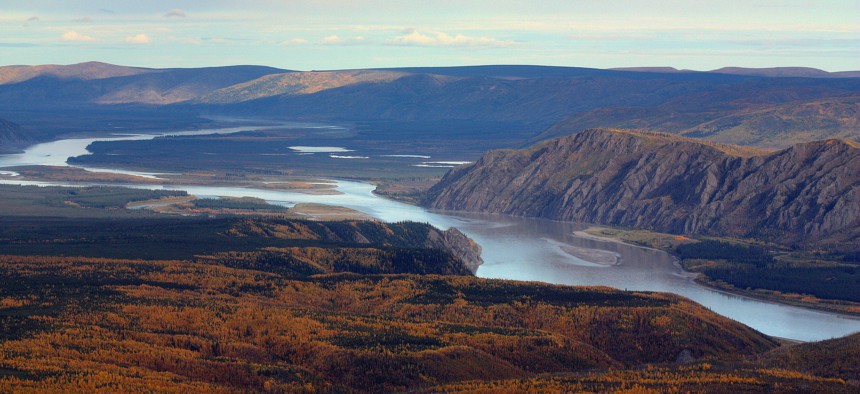Hovercraft Case in Alaska Tests Federal Rules on Rivers in National Parks

The Yukon River in Alaska. A Supreme Court case will look at whether the National Park Service or Alaska governs use of rivers in national parks in the state. National Park Service / K. Hill
A 9th Circuit decision—now before the U.S. Supreme Court— is being viewed by some as a potential “springboard for the expansion of federal control over state-owned navigable waters throughout the country.”
In 2007, National Park Service rangers encountered Alaskan moose hunter John Sturgeon on the Nation River, telling him he couldn’t use his hovercraft on the water flowing through the Yukon-Charley Rivers National Preserve.
That stop spawned a multi-year legal battle that Alaskan news reports say has cost Sturgeon and his backers as much as $800,000 and has already once been considered by the U.S. Supreme Court. The justices will hear it again in November, settling the dispute of whether the federal government or Alaska—and potentially other states—makes the rules about what can happen on rivers running through national parks.
Sturgeon sued the National Park Service in 2011, saying that under Alaska law he was allowed to use the hovercraft, a boat that glides along water or wetlands on a cushion of air. But the National Park Service bans them, finding that they are able to get to land or waters that would be spoiled by “motorized equipment.”
A 9th U.S. Circuit Court of Appeals panel last year found that the federal government, not Alaska, should regulate use of hovercraft on rivers within Alaskan preserves.
Environmentalists heralded the decision, saying it will allow the parks service to properly manage vulnerable habitat.
“The moves by the state to wrest management away we feel is really looking at allowing special interests and others into these waterways,” Dan Ritzman, director of the Sierra Club’s land, water and wildlife campaign, told Route Fifty. “For us the bedrock issue there is that these lands are meant for all Americans and that is the role of these federal agencies and the park service, and that is why we are pushing to keep them in charge of the management.”
But Alaska’s governor and attorney general have joined Sturgeon in trying to overturn the decision, saying the decision wrongly ignores laws, particularly the Alaska National Interest Lands Conservation Act, that give the state special rights when it comes to public lands.
In a prepared statement last month, Attorney General Jahna Lindemuth lambasted the decision as “both bad law and bad for Alaska.”
In an amicus brief filed with the Supreme Court, Alaska argues that the 9th Circuit decision violates its sovereignty and fails to recognize the special circumstances of a vast state with citizens living in remote areas.
“The federal government’s national prohibition on hovercraft use might be sensible in Lower 48 parks where waters are often used only for recreational activities and tourism, but it is overbearing and harmful in Alaska, where, even in remote wilderness areas, citizens must use rivers for everyday transportation and to access necessities like food, fuel, and health care,” the brief says.
Attorneys general for nine other states have raised whether the decision isn’t just limited to the special case of Alaska, saying the 9th Circuit’s legal interpretation could infringe more broadly on states’ ability to regulate river use. In a brief filed by Idaho Attorney General Lawrence Wasden’s office, the AGs say they are concerned the decision, if upheld by the Supreme Court, “may be treated as a springboard for the expansion of federal control over state-owned navigable waters throughout the country.”
The states argue that federal law, and particularly the Submerged Lands Act passed in 1953, gives them authority over rivers and other waters through their ownership of the land under the water.
The Park Service offered a different interpretation if that law in a brief filed earlier this month, saying that Congress gave states, for example, ownership of riverbeds underneath navigable waters, but didn’t give them authority over use of the water. This means in national parks—in Alaska and elsewhere—the service makes the rules on navigable waters, says the brief by the solicitor general’s office.
In terms of the Sturgeon case in particular, the Park Service argues that the limits some would impose on their authority in Alaska don’t make sense in practice, saying it would essentially create a “patchwork of jurisdiction.” Rangers could regulate use of non-navigable stretches of water in park land, but not once they become navigable.
“That approach, however, would often make the duties of Park Service rangers impossible,” the brief says.
Laura Maggi is the Managing Editor for Government Executive's Route Fifty and is based in Washington, D.C.
NEXT STORY: For Millions, Florence 'Has Never Been More Dangerous'






